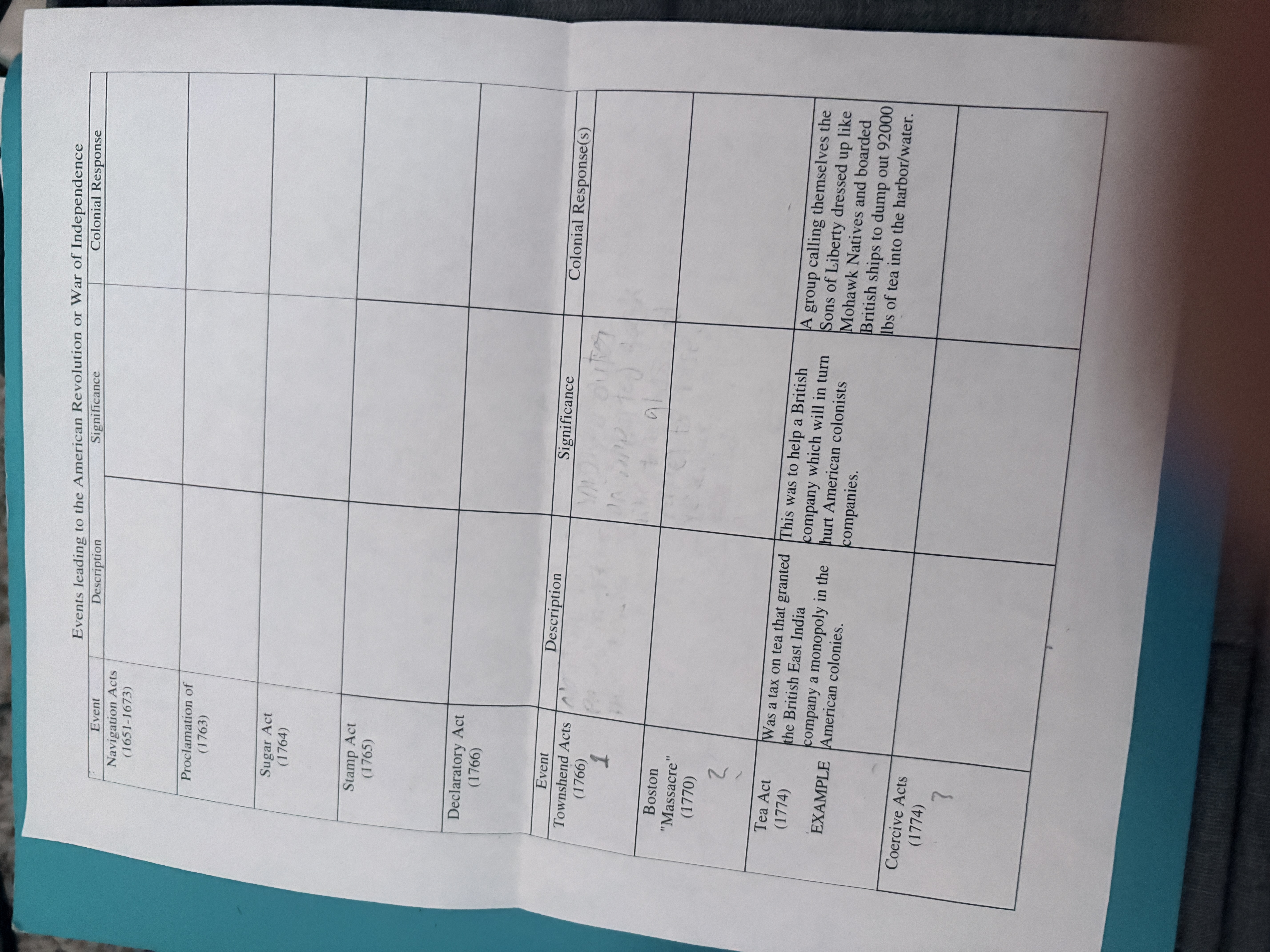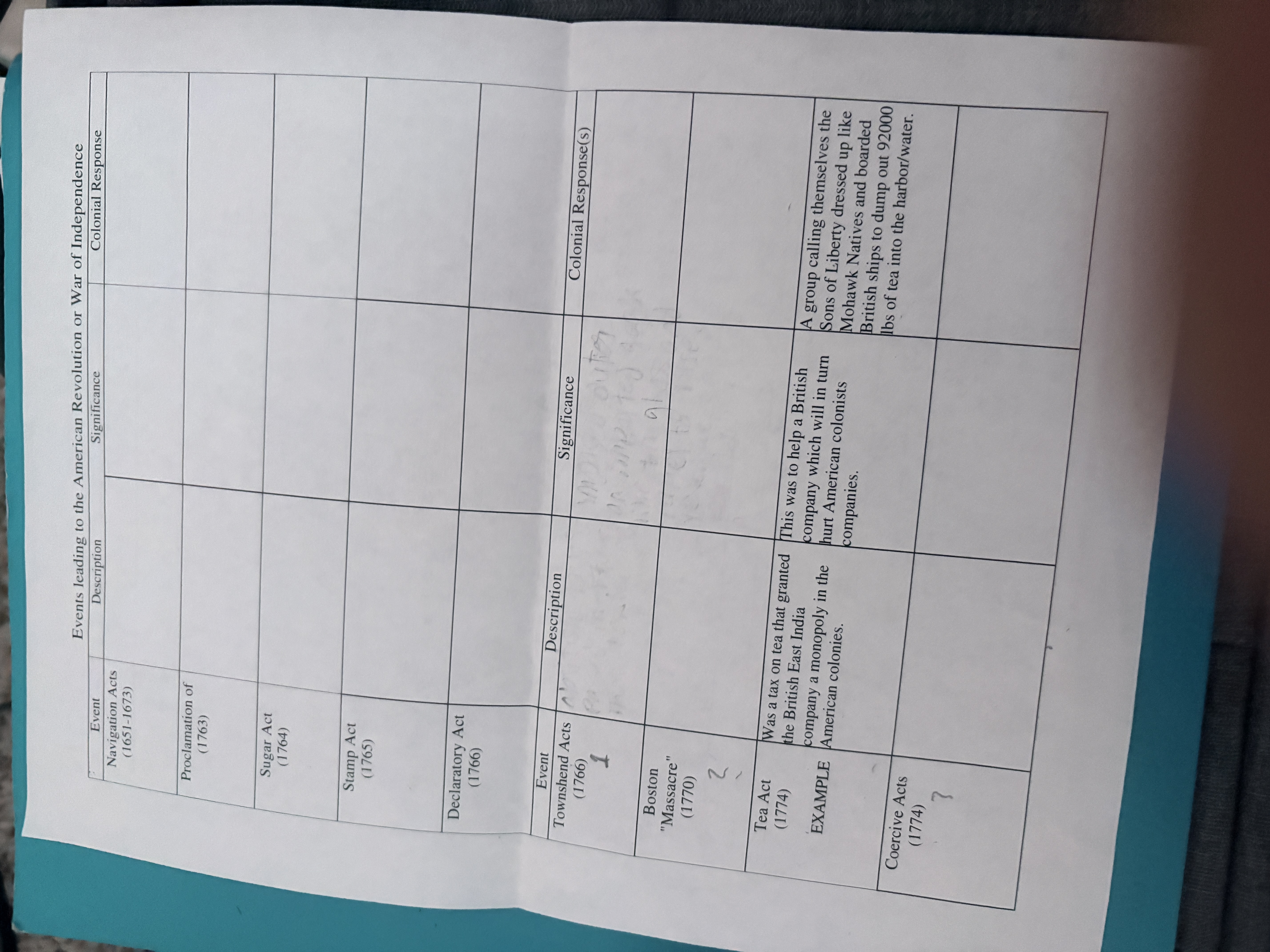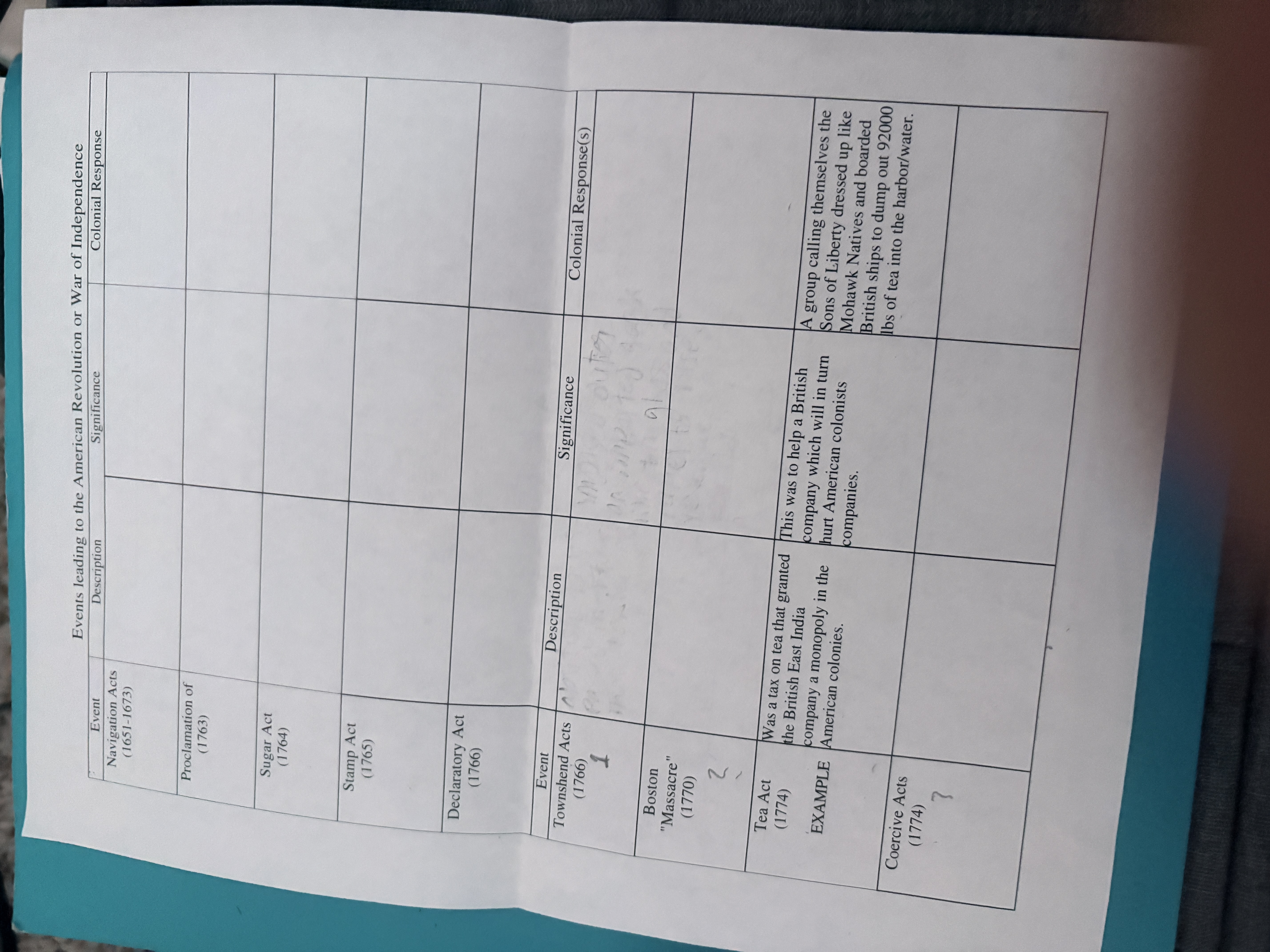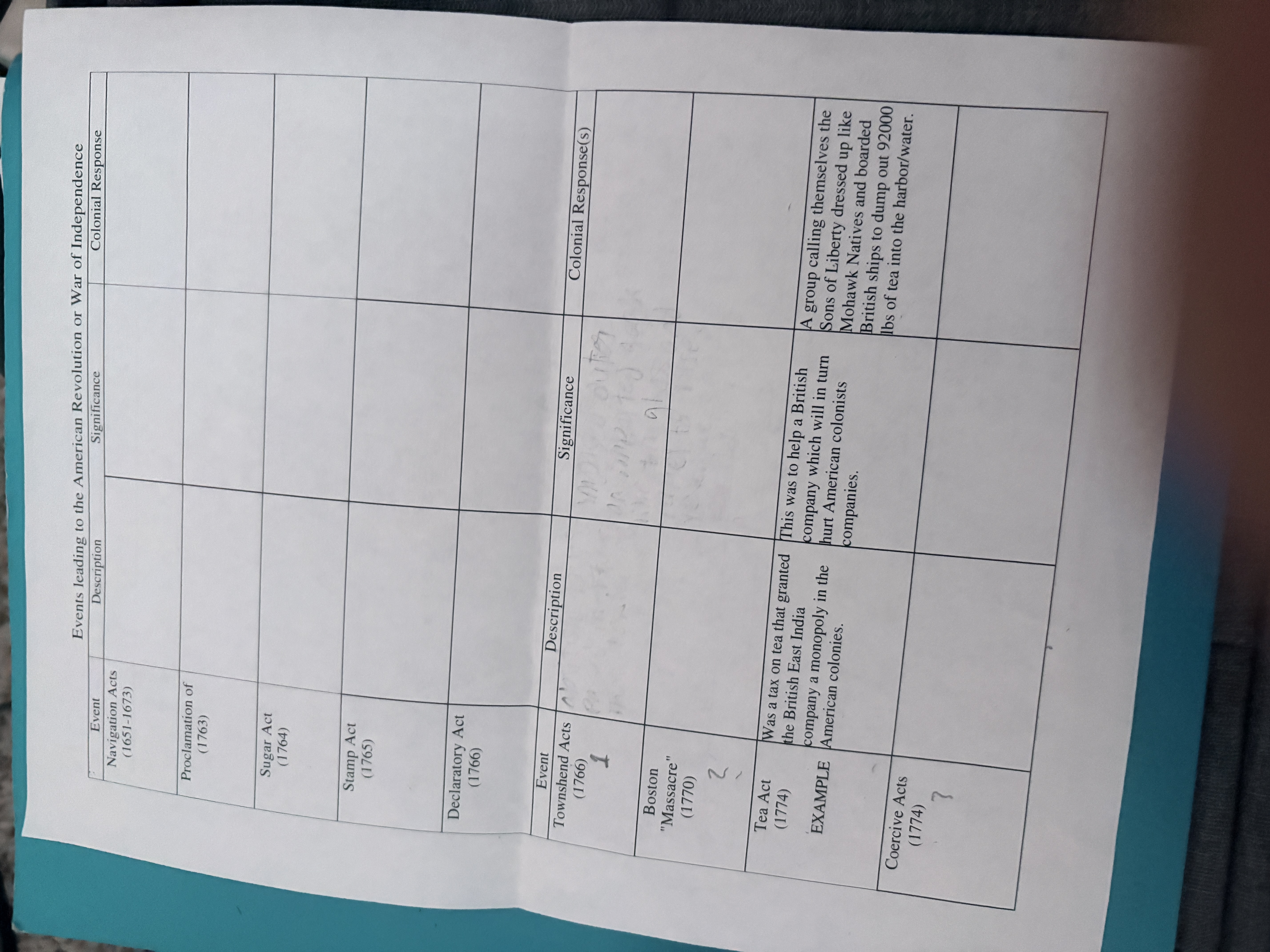Usa
1/12
There's no tags or description
Looks like no tags are added yet.
Name | Mastery | Learn | Test | Matching | Spaced |
|---|
No study sessions yet.
13 Terms




Navigation Acts (1651-1673)
Description
A series of laws passed by the British Parliament to regulate colonial trade and shipping. They mandated that most colonial goods had to be shipped on British ships, often passing through British ports, and certain "enumerated" goods could only be exported to England.
Significance
Aimed to bring wealth to England and strengthen its merchant marine at the expense of colonial and rival trade. Led to mercantilist policies and fostered smuggling among colonists.
Colonial Response(s)
Widespread smuggling, disregard for the acts, and resentment over economic restrictions. Led to early conflicts between colonial merchants and British authorities.
Proclamation of 1763
Description
A British decree issued after the French and Indian War that prohibited Anglo-American colonists from settling west of the Appalachian Mountains.
Significance
Angered colonists who felt they had a right to expand westward after fighting in the war. It was seen as an infringement on their liberty and economic opportunity.
Colonial Response(s)
Widespread disregard for the proclamation; many settlers moved west anyway. Increased frustration with British control over colonial expansion.
Sugar Act (1764)
Description
Also known as the Revenue Act of 1764, this law imposed a tax on sugar, molasses, and other goods imported into the colonies. It also strengthened enforcement against smuggling.
Significance
First direct tax on the colonies specifically to raise revenue for Britain, rather than just regulating trade. Aimed to stop illegal trade with the French and Spanish West Indies. Sparked the cry "No taxation without representation."
Colonial Response(s)
Protests, petitions, and boycotts of British goods. Formation of committees of correspondence. Led to the argument that Parliament could not tax colonists without their direct representation.
Stamp Act (1765)
Description
Legislation passed by the British Parliament that required colonists to purchase special stamped paper for all legal documents, newspapers, pamphlets, playing cards, and dice.
Significance
First direct internal tax on the colonies, affecting almost every colonist. Unified colonial opposition more broadly than previous acts. Further inflamed the "no taxation without representation" argument.
Colonial Response(s)
Widespread and often violent protests. Formation of the Sons of Liberty. Boycotts of British goods. The Stamp Act Congress issued a declaration against the tax. Parliament repealed the act due to colonial pressure.
Declaratory Act (1766)
Description
An act passed by the British Parliament asserting its full power and authority to make laws binding the colonies "in all cases whatsoever." It was passed simultaneously with the repeal of the Stamp Act.
Significance
While repealing the unpopular Stamp Act, Parliament maintained its right to legislate for the colonies, setting the stage for future conflicts over parliamentary supremacy.
Colonial Response(s)
Colonists celebrated the repeal of the Stamp Act, largely overlooking or downplaying the implications of the Declaratory Act's assertion of parliamentary authority.
Townshend Acts (1767)
Description
A series of acts passed by the British Parliament that imposed duties on imports of glass, lead, paints, paper, and tea into the colonies. It also established a Board of Customs Commissioners in Boston and allowed for the use of Writs of Assistance (general search warrants).
Significance
Aimed to raise revenue to pay the salaries of colonial governors and judges, making them independent of colonial assemblies. Further provoked colonial anger over taxation without representation and threatened colonial self-governance.
Colonial Response(s)
Renewed boycotts of British goods (non-importation agreements). Widespread protests. "Letters from a Farmer in Pennsylvania" by John Dickinson argued against the legality of the acts. Increased friction between colonists and British troops.
Boston "Massacre" (1770)
Description
A confrontation between British soldiers and a crowd of Bostonians. British soldiers fired into the crowd, killing five colonists.
Significance
Became a symbol of British tyranny and oppression, used by colonial propagandists (like Paul Revere and Samuel Adams) to rally support against British rule. Heightened tensions between colonists and British authorities.
Colonial Response(s)
Intense public outrage and protests. Funerals for the victims became political demonstrations. Samuel Adams and others used the event to inflame anti-British sentiment. John Adams successfully defended the soldiers in court, demonstrating colonial commitment to justice.
Tea Act (1774)
Description
Was a tax on tea (passed in 1773) that granted the British East India Company a monopoly in the American colonies, allowing them to sell tea directly to the colonies without paying taxes that colonial merchants had to pay.
Significance
This was to help a financially struggling British company, which in turn financially hurt American colonial companies and merchants. It was seen as another attempt by Parliament to assert its right to tax the colonies.
Colonial Response(s)
A group calling themselves the Sons of Liberty dressed up like Mohawk Natives and boarded British ships to dump out 92,000 lbs of tea into the harbor/water during the event known as the Boston Tea Party.
Coercive Acts (1774)
Description
Known as the Intolerable Acts by colonists, these were a series of punitive laws passed by the British Parliament in response to the Boston Tea Party. They included the Boston Port Act (closed Boston Harbor), the Massachusetts Government Act (curtailed self-governance), the Administration of Justice Act (allowed trials of British officials to be moved to Britain), and an expanded Quartering Act.
Significance
Intended to punish Massachusetts and deter other colonies, but instead solidified colonial unity against British oppression. Directly led to the convening of the First Continental Congress.
Colonial Response(s)
Outrage across all colonies. Led to the First Continental Congress, where delegates from 12 colonies (Georgia absent) met to coordinate a response, including a declaration of rights and a ban on trade with Britain. Prepared for potential conflict.